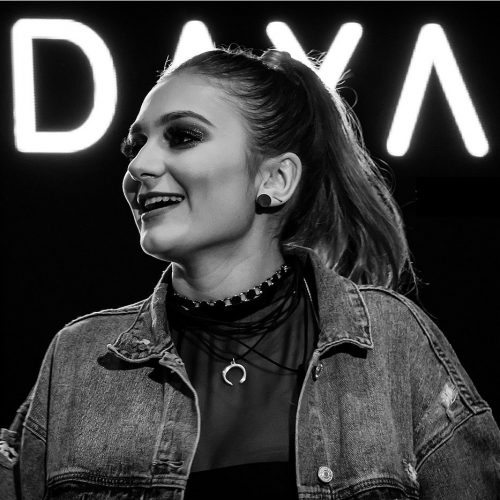It is our sacred quest in this series to find the songs that even snobby music lovers can appreciate. Yes, believe it or not, there have been some phenomenal songs in the last few years that were cleverly disguised as over-commercialized ear worms. So here we go, setting forth to find the songs that you shouldn’t be embarrassed to secretly love.
You should like “Sit Still, Look Pretty.”
The song that is the subject of our studies today, “Sit Still, Look Pretty,” by Daya, holds a special place in my heart, the place I call “the dark, festering hole of putrescence that was scooped out by the insincere malice of offensively obtuse ‘girl power’ songs.”
Which, I suppose, is a statement that demands explanation, so allow me to clarify. I’m a proud feminist. Women rock, and some of the societal issues that they have to deal with are patently unfair and need attention. Period.
HOWEVER, soulless marketers looking to make a fast cash grab have also realized this, and as a result, songs (and pop culture in general) have been flooded with insincere messages about being perfect “just the way you are.”
I have to admit, I don’t have the statistics to back this up, but I bet if you did an analysis of song lyrics, the phrase “just the way you are” would show up more in the last ten years than it has in the entire history of music up to that point. Which is fine, and a great message to send, but it’s just so… calculated.
It’s a cheap trick to sell records to insecure people.
And it drives me nuts (want to see the definition of ‘contrived?’ Listen to “Try,” by Cobbie Callet, and tell me you can’t just see her producer sitting with her and being like “It’s okay, I guess, but don’t you think we could hit this ‘don’t be insecure’ thing a little harder? Let’s just tunelessly mumble platitudes until someone gives us an award for understanding women so well.”).
Which is why that festering hole in my heart is filled by “Sit Still, Look Pretty.” It’s a girl power song that a) is a good song, and b) doesn’t make me roll my eyes so hard that I literally die.
Since we started with the issue of empowerment, we’ll stay on that topic before we move on to examining the composition of the song.
So, why do I love this song’s message when it’s so similar to others I find disingenuous?
Mostly, because of the point of view it’s from. Take a look:
Oh, I don’t know what you’ve been told
But this gal right here’s gonna rule the world
Yeah, that is where I’m gonna be
Because I wanna be
No, I don’t wanna sit still, look pretty.
Daya is not condescendingly preaching “Oh, honey, I know you cry every day because you’re fat, but you don’t have to.” No, she’s standing up and saying “**** the system, I’m awesome and can do whatever I want.”
And THAT is a message that real people can relate to. It’s inspiring. It’s “I’M awesome,” not “YOU’RE awesome” (which is always going to be insincere coming from a celebrity). And I think that’s an important distinction that bridges the gap from commercial shlock to empowerment (alright, fine, I’m getting off my soapbox now, but I did want to add the disclaimer that you can find empowerment in whatever you want. I just prefer this kind, but I wouldn’t want to assume that my experience is universal).
Okay, so let’s move on – and to start, if you haven’t already, take a listen to the song here.
Compositionally, this song does one specific thing very well: it varies sentence/line length. This is an old writing trick. Take a look at the following example that I’m making up on the spot:
Paragraph A: “He ran until he couldn’t run anymore. His side began to burn from a stitch. Finally, he was out of breath, and gasping. Unable to go another step, he stopped.”
Paragraph B: “He ran. He ran until he couldn’t run anymore, until a stitch burned in his side, and his breath came in gasps and he couldn’t take one more step. He stopped.”
See how the lines in Paragraph A are roughly uniform in length? But in B, they vary startlingly from short to long, and long to short? That’s a more interesting rhythm, as a reader.
A lot of song writers (*cough* me) approach their lyrics like they’re sonnets, putting the same number of syllables in each line, and go from there. But, honestly, it’s boring. Daya doesn’t have this problem. Listen to the opening of the song, or read it here with the melody in mind:
Could dress up
To get love
But guess what?
I’m never gonna be that girl
Who’s living in a Barbie world.
Short, short, short, long, long. It provides a natural, easy syncopation to the lyrics, and keeps it interesting.
It also allows her to line up some sick slant rhymes (also known as half rhymes) with “dress,” “get,” and “guess,” all rhyming on the “e” sound, and “up,” “love,” and “what” all rhyming on the “uh” sound, which is pretty cool. It’s a great verse
But none of it is accidental; it’s intentionally structured this way, with the short lines being punchy, and the longer lines smooth, and it’s awesome.







